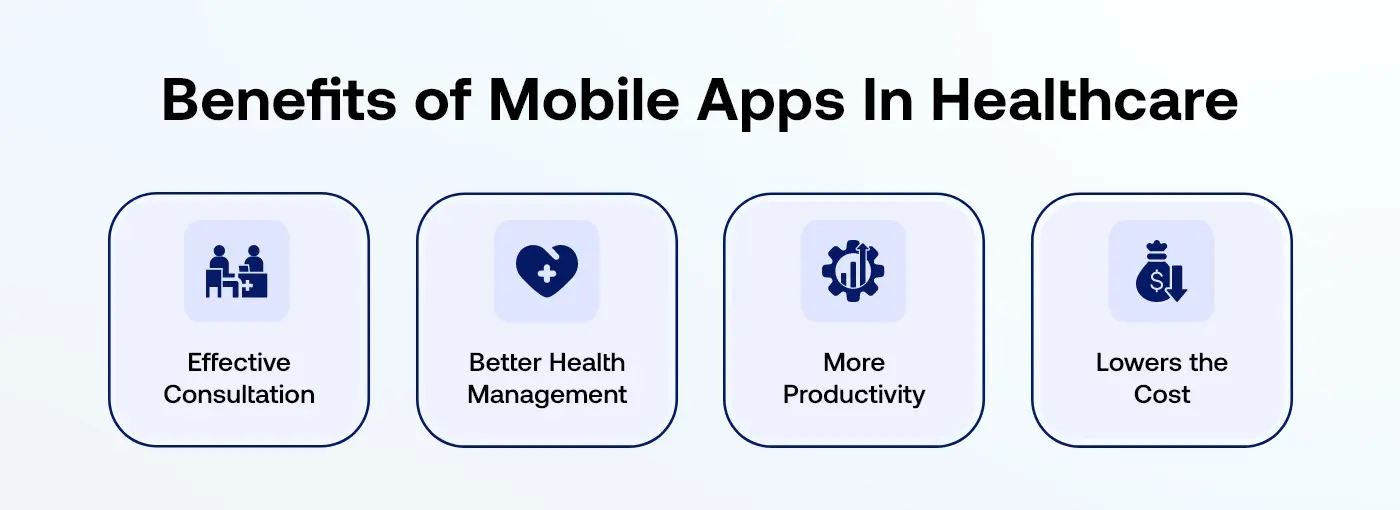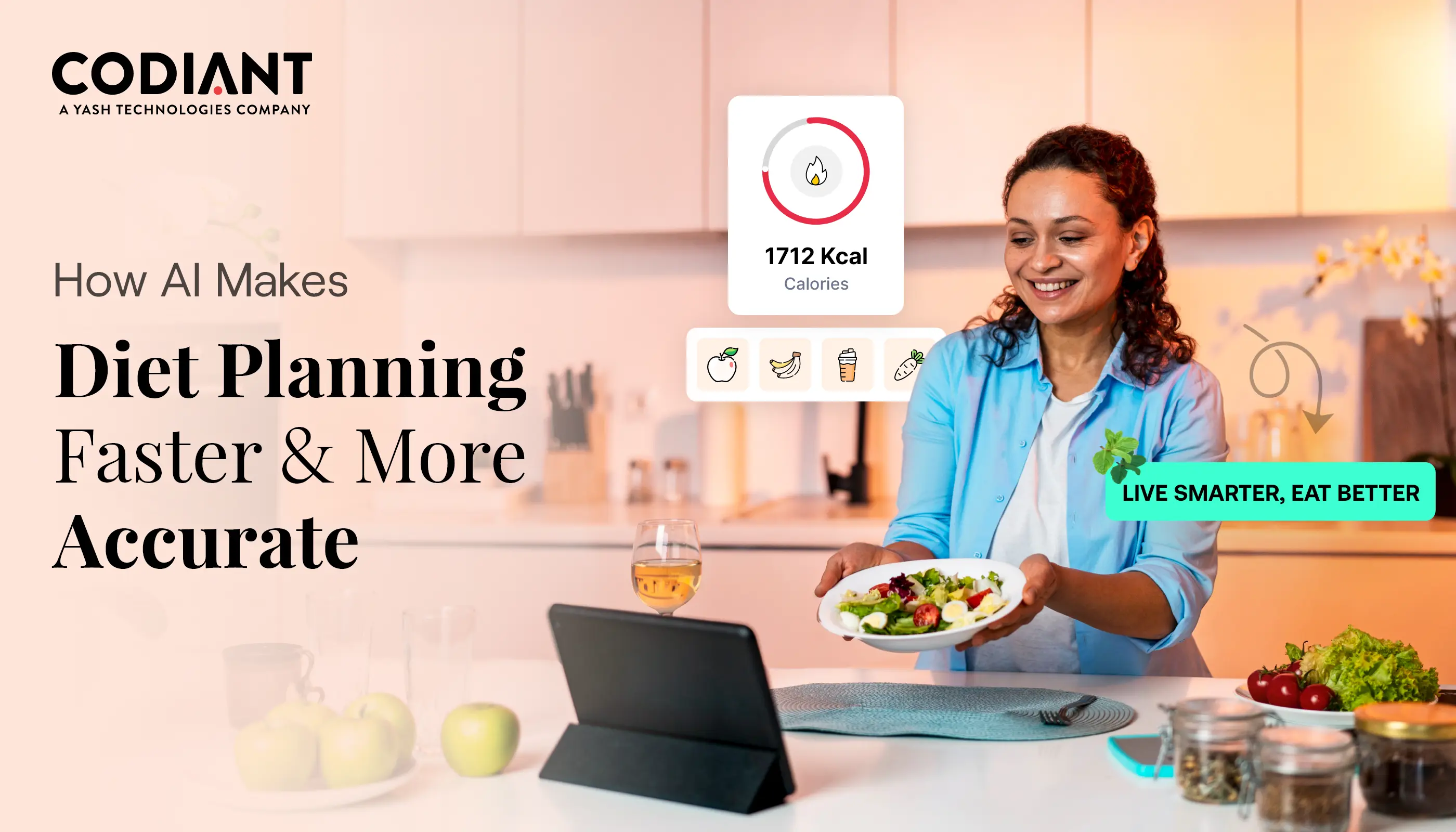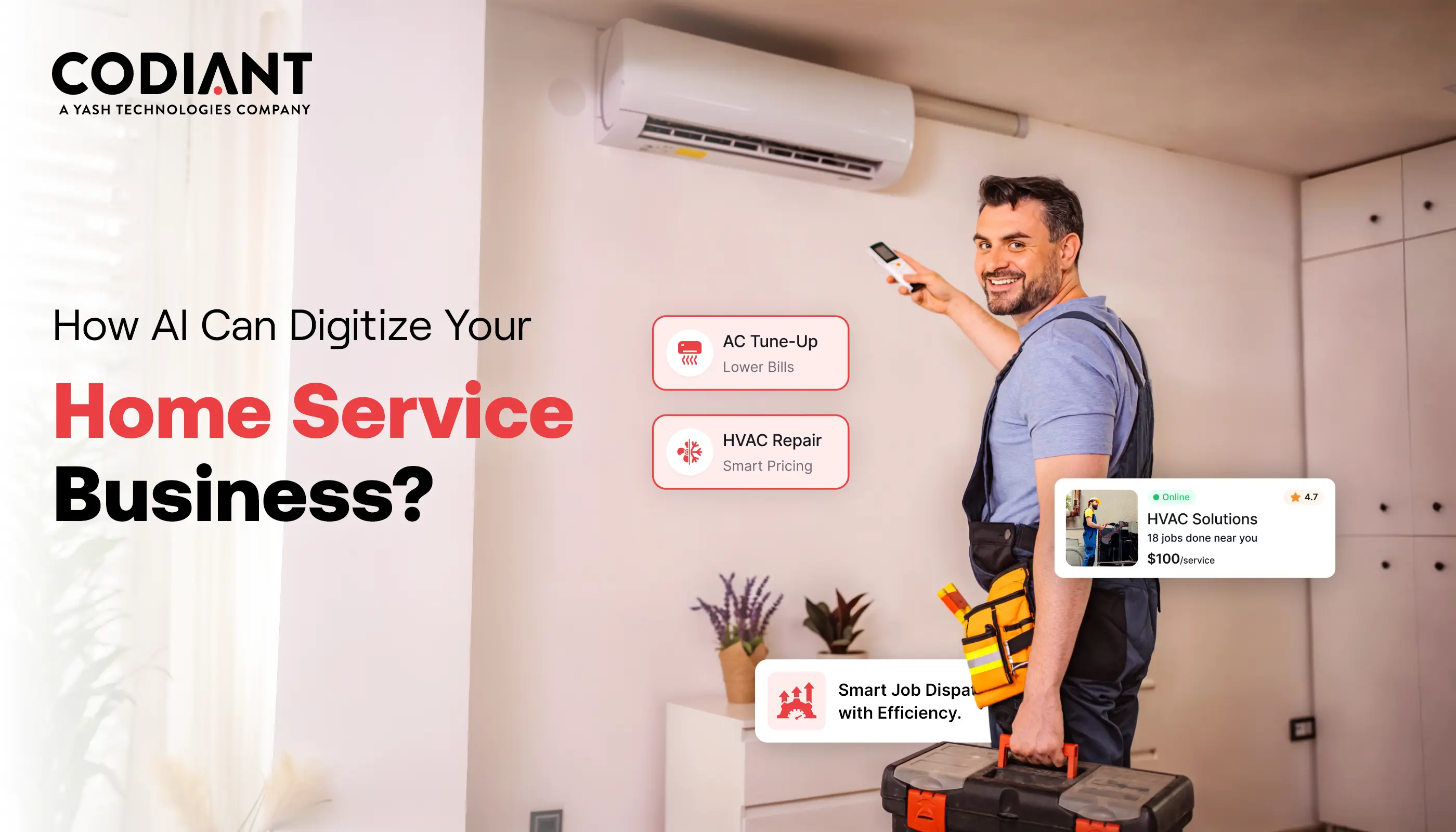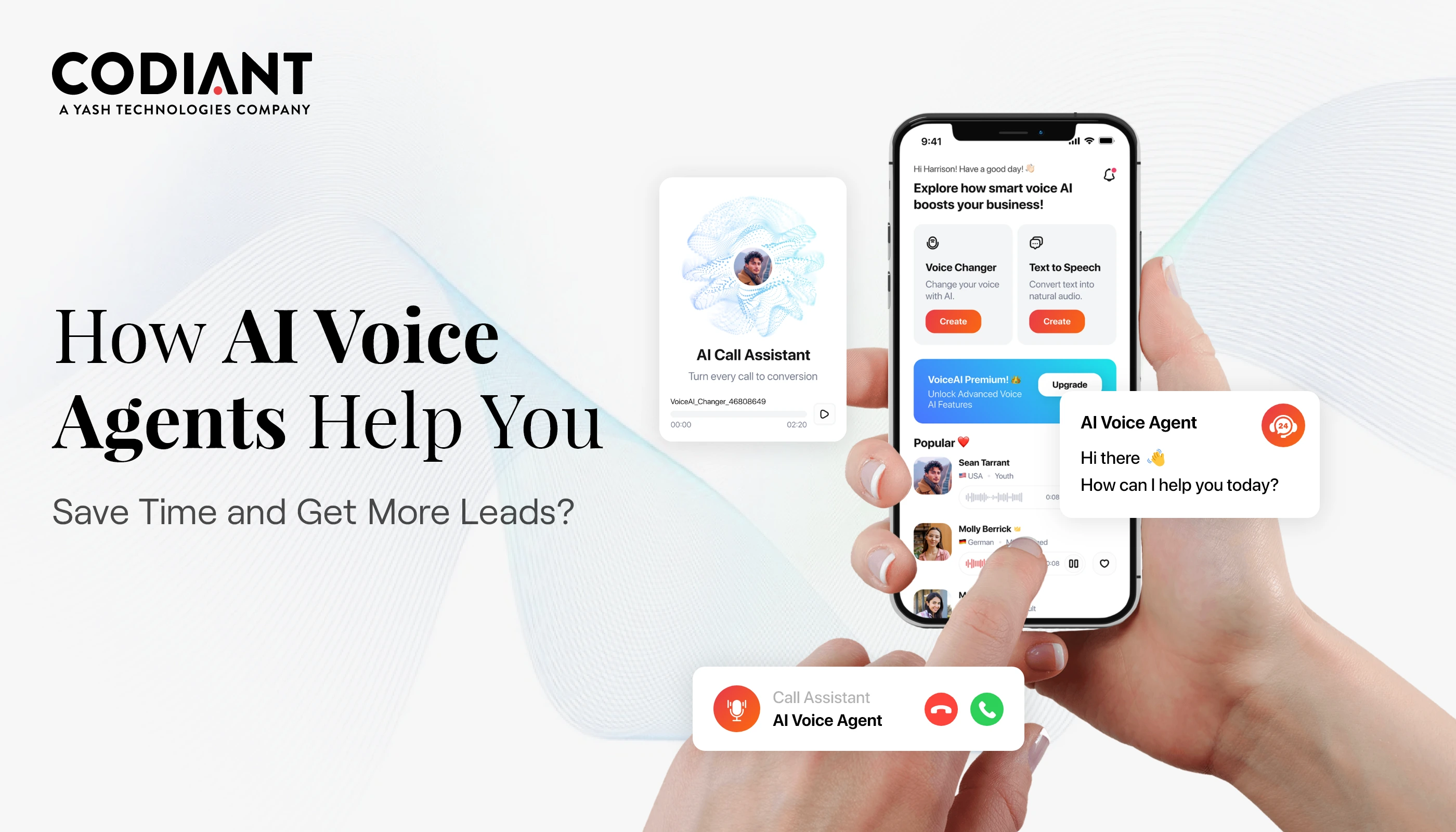Top Reasons Why Healthcare Providers Need Mobile Apps Today
Table of Contents
Subscribe To Our Newsletter
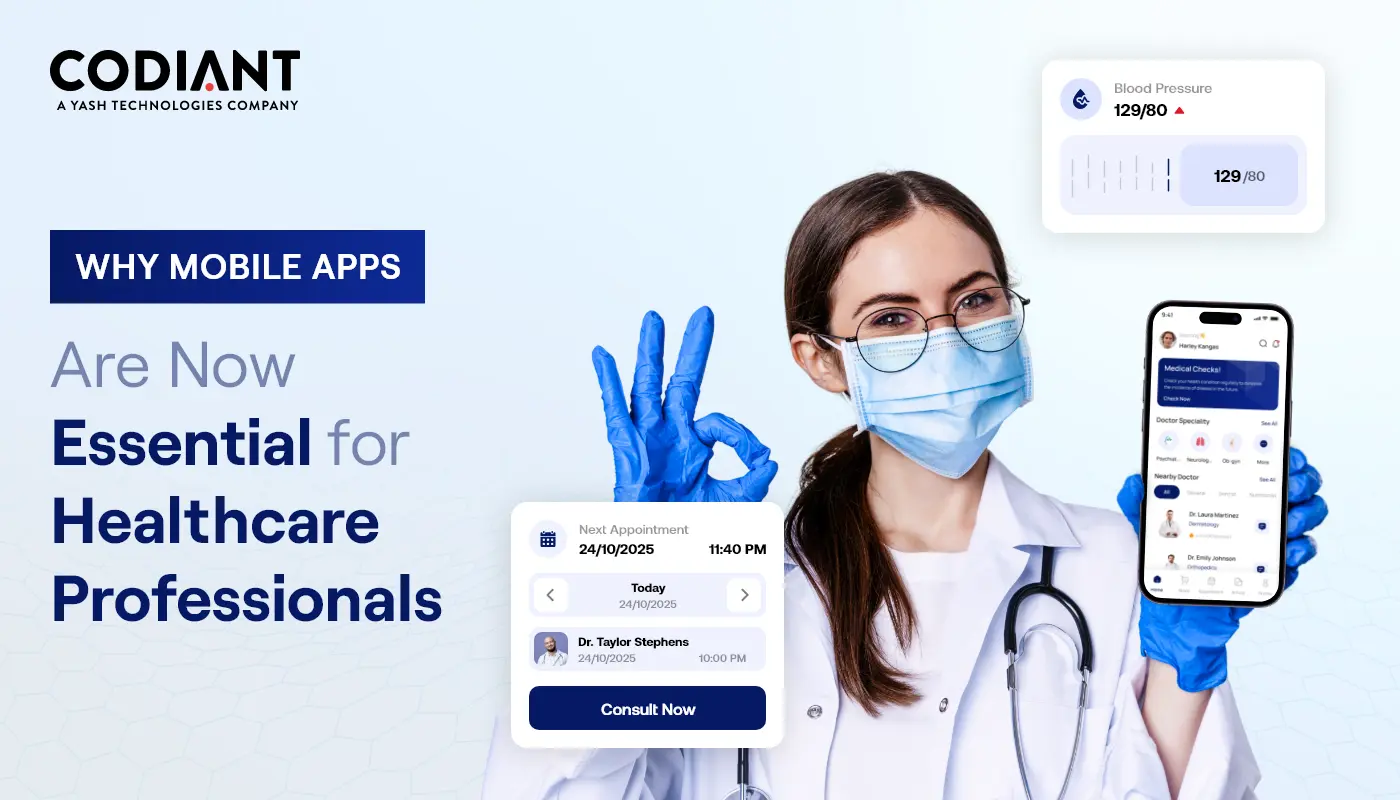
If you’ve been to a clinic lately, you might have noticed something new-paper forms are almost gone and screens are everywhere. From booking doctor visits online to checking your recovery updates on your phone mobile apps for hospitals and clinics are changing how healthcare works.
Today, people want care that’s fast, personal and always available-and that’s exactly what healthcare app development solution offers. They connect doctors, nurses, and patients through something we all use every day-a smartphone. No more long waits missing records or repeated phone calls. Just quick, smart & easy care.
For healthcare professionals, these apps are more than just digital tools-they make their jobs easier. Doctors can track patients with chronic diseases remotely update health records in real time & even use AI to help with diagnoses. Nurses can monitor vitals instantly pharmacists can handle prescriptions online, and hospital staff can reduce piles of paperwork.
For patients, it’s empowering. They can see lab results right away, set reminders for medicines & chat safely with their healthcare team. Everything feels simpler, faster and more human.
In short, mobile apps aren’t just changing how hospitals operate-they’re changing how care feels. In the next sections, we’ll explore why healthcare providers need these apps today, what’s driving this digital shift and how it’s shaping the future of modern medicine.
Ready to Build the Next-Gen Healthcare App?
The future of healthcare is already mobile and it’s time your organization joined the movement. Whether you’re a hospital looking to improve workflows, a clinic aiming to boost patient engagement, or a start-up planning your first digital health platform, we can help.
At Codiant, we design and develop secure, scalable, and compliant apps for healthcare that simplify operations, empower professionals, and elevate patient experiences.
The Current State of Healthcare Technology
Healthcare today is standing at a major crossroads. On one side you have outdated systems-paper records, manual scheduling and slow communication that keep both patients and doctors waiting. On the other you have a fast-growing world of apps for healthcare that make information flow instant, secure and accessible from anywhere. The difference between the two is like night and day.
Over the past few years, hospitals and clinics have made big leaps toward digital transformation. Electronic Health Records (EHRs), telemedicine platforms and wearable devices have already changed how care is delivered. But the real game-changer now lies in mobile apps for hospitals and clinics which are bringing all these technologies together in one connected experience.
Think about it- a doctor can now check patient histories on the go update charts in real time, and consult with specialists halfway across the world-all through a single mobile app. Patients can book appointments, pay bills or chat with their care team without stepping out of their homes. The pandemic accelerated this change, turning mobile healthcare apps a necessity.
Still, many healthcare providers struggle with old systems that don’t talk to each other, long admin processes & data silos that delay care. That’s why apps for healthcare professionals are not just helping-they’re solving real day-to-day problems in hospitals and clinics by cutting through these barriers.
Mobile apps have moved beyond convenience. They’re now essential tools for efficiency, patient engagement and even survival in a competitive healthcare market.
Below are some key trends and figures that show why mobile apps for hospitals and clinics are no longer optional – they’re crucial.
- The global healthcare mobile application market is projected to be worth USD 165.22 billion in 2025.
- In 2024, the industry already generated USD 114.06 billion, indicating just how fast it’s accelerating.
- The broader digital health market is estimated to reach USD 427.24 billion in 2025, up from about USD 376.7 billion in 2024 – a sign that health tech is becoming a dominant vertical.
- In India, the mHealth apps market is on a rapid growth curve, with expectations to hit USD 4,827 million by 2030, growing at a CAGR of ~16.8% from 2025 onward.
- Health plan mobile app usage has jumped ~22% year-on-year (as of mid-2025) in some markets, showing stronger consumer adoption.
- Over 54,500 healthcare/medical apps were available on the Google Play Store in recent quarters – a crowded space, but also one with massive opportunity.
- Meanwhile, more than 70% of health system C-suite executives across multiple countries believe improving operational efficiency and productivity is a top priority in 2025.
These numbers reinforce a few truths –
- Scale is enormous. We’re no longer talking niche tools – mobile health is becoming a core pillar in healthcare infrastructure.
- Growth is accelerating. Year-over-year gains and market forecasts show momentum, not a plateau.
- Providers must act now. With executives prioritizing efficiency, the pressure is on for hospitals and clinics to adopt or risk falling behind.
Why Healthcare Providers Are Turning to Mobile Apps?
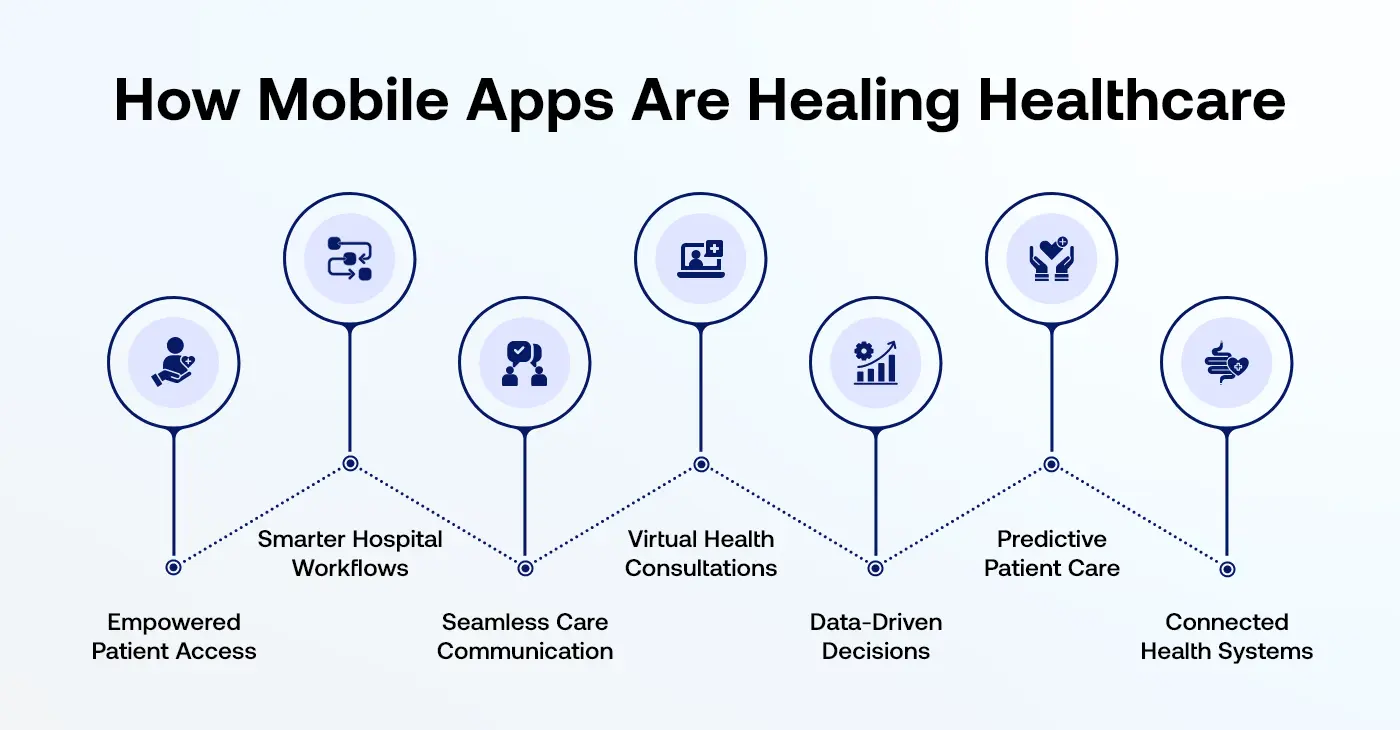
Walk into any hospital today & you’ll notice something different. Doctors are carrying tablets instead of clipboards. Nurses are updating charts on phones. Patients are checking in through digital kiosks. The quiet revolution behind all this? Mobile apps for hospitals and clinics.
-
Patients Have Become Digital-First
We’re living in the age of one-click convenience. People shop, pay bills & even order dinner from their phones-so why not manage health the same way? When patients can book appointments, track prescriptions, or get lab results through an app, it feels natural and easy.
For healthcare providers, this shift means they must meet patients where they already are-on their smartphones. That’s why apps for healthcare professionals are being designed not just for back-end systems but also for front-end engagement. Mobile health apps now allow patients to:
- Schedule visits without waiting on hold.
- Chat directly with their doctor or nurse.
- Receive instant test results.
- Set reminders for medications.
- Access personal health records anytime.
This level of access keeps patients informed and involved, reducing no-shows and missed treatments. A more engaged patient is a healthier patient-and a happier one too.
-
Hospitals Need Efficiency, Not More Staff
Every hospital struggles with one truth- there’s always more work than hands to do it. Managing records, handling calls, filing paperwork-it eats up valuable time. Mobile apps for hospitals and clinics are changing that by automating routine tasks.
Doctors can update records on the go instead of waiting to log into desktops. Nurses can scan patient barcodes to update medication logs instantly. Even simple things like bed management or patient transfers can be handled through real-time app dashboards.
One large health network reported saving over 2 hours per clinician per day after adopting a unified hospital app. That’s time redirected back to what matters most-treating patients.
Automation doesn’t replace staff; it amplifies them. Instead of doing admin work, providers focus on care. That’s how hospitals improve both efficiency and morale.
-
Real-Time Communication Saves Lives
In healthcare, minutes can mean everything. When emergencies strike, the old way-phone calls, pages, waiting for callbacks-costs time. Apps for healthcare professionals make real-time collaboration possible.
Imagine a trauma team that receives instant alerts with patient vitals, lab updates and doctor notes synced across devices. A cardiologist can view an ECG remotely and give guidance before the patient even reaches the hospital.
These apps connect surgeons, anesthetists, nurses & admin staff in one digital loop. No crossed wires, no missed messages-just faster, clearer coordination.
Communication tools also extend to patients. A quick app message from the doctor saying, “Your test looks good-keep taking your meds,” builds trust and prevents unnecessary visits. It’s simple but powerful.
-
The Rise of Remote and Virtual Care
When the pandemic hit, hospitals were overwhelmed, and patients stayed home. That crisis accelerated one of the biggest shifts in healthcare in decades – telemedicine.
Now, apps for healthcare make virtual care easy and secure. Patients can book a video consultation, upload reports, and get e-prescriptions without stepping into a clinic. Providers monitor chronic illnesses like diabetes or hypertension remotely through connected devices that send data straight to the doctor’s phone.
For rural or mobility-restricted patients, mobile healthcare apps close the distance gap. And for hospitals, they help manage loads efficiently while maintaining continuous care.
Telemedicine isn’t a trend anymore-it’s a core service. Apps have made it seamless, regulated & patient-friendly.
-
Data- The New Backbone of Care
Healthcare runs on data-test results, vitals, allergies, past treatments-but managing that data used to be painful. Records were lost, duplicated, or outdated. Now, mobile apps for hospitals and clinics sync directly with Electronic Health Records (EHRs), keeping data unified and accurate.
This means a doctor can open a patient’s entire medical history in seconds. A nurse can log updates instantly after a visit. Administrators can analyze trends, spot inefficiencies & forecast needs.
Even better, AI-driven analytics within these apps can detect patterns that humans might miss-like early signs of infection or readmission risk. With these insights, hospitals can shift from reactive care to preventive care.
In short- better data equals better decisions & better decisions save lives.
-
Security Is Finally Catching Up
When patient data goes digital, the first question everyone asks is- “Is it safe?” And that’s a fair concern. But modern apps for healthcare professionals are built with security as a top priority.
Encryption, multi-factor authentication & HIPAA-compliant protocols ensure sensitive data stays private. Some apps even include biometric logins or role-based access-so only authorized staff can view patient information.
This focus on privacy doesn’t just protect patients; it builds trust. When people know their health data is secure, they’re more likely to use mobile healthcare services actively. Trust, after all, is the foundation of care.
-
Healthcare Is Moving From Reactive to Predictive
Here’s a quiet but massive shift happening inside every smart hospital- predictive healthcare. Mobile apps are now powered by AI that can analyze past medical data and predict possible risks before they happen.
For example, an app can flag a patient likely to miss a medication refill or detect unusual heart patterns through a connected wearable. Doctors can then intervene early, preventing complications.
This proactive model of care-powered by apps for healthcare-not only saves lives but also reduces costs. Preventing an emergency is far cheaper than responding to one. That’s why hospitals are investing heavily in predictive mobile solutions today.
-
Better Experience, Happier Patients
Healthcare isn’t only about treatment-it’s about experience. Long waiting times, confusing paperwork, or lost reports can frustrate patients. A simple, well-designed mobile app can change that instantly.
With user-friendly interfaces, clear navigation, and quick notifications, patients feel cared for, not just managed. They can track recovery progress, read doctor’s advice & even share feedback in real time.
For hospitals, these insights turn into measurable improvements. Higher satisfaction scores mean better reviews, repeat visits and stronger reputation. In the world of healthcare, patient happiness directly impacts business health.
-
Lower Costs, Higher ROI
Building a mobile app may seem like a big investment at first, but the payoff is long-term. Apps for healthcare professionals reduce manual errors, optimize scheduling and cut down on unnecessary visits-all of which save money.
Hospitals using mobile apps report lower administrative costs, fewer readmissions & higher patient retention. A Deloitte study even found that healthcare systems using mobile technologies saw a > 20 percent reduction in operational waste.
In simple terms, smarter apps equal smarter spending. When technology runs smoothly, people and profits follow.
-
Collaboration Across the Entire Ecosystem
Modern healthcare is rarely about a single doctor. It’s a network-primary care physicians, specialists, labs, insurers & patients-all working together. The challenge has always been coordination.
Mobile healthcare apps fix that. A surgeon can upload post-operative notes, which instantly notify the physiotherapist. The patient’s progress data flows back to the doctor. The insurance provider gets claim data automatically. No faxes, no waiting, no confusion.
This ecosystem-wide collaboration turns healthcare into a connected circle of care-transparent, efficient, and fast.
-
The Pressure of Competition
Healthcare is not just about healing-it’s also a business. Patients now compare hospitals like they compare restaurants or airlines. They check reviews, ease of booking and digital experience before choosing where to go.
Hospitals without mobile presence risk falling behind. Those with seamless apps gain an edge-stronger loyalty, smoother operations, and higher visibility on search platforms. For clinics looking to grow, investing in mobile apps for hospitals and clinics is not optional anymore-it’s a survival strategy.
Digital adoption isn’t about keeping up; it’s about staying relevant.
-
Bridging the Urban–Rural Divide
In large countries like India, the U.S., or Australia, rural areas often lack access to top-tier healthcare. That’s changing with apps for healthcare.
Through telemedicine, rural patients can now consult city specialists without traveling miles. Health workers can collect data in the field and sync it instantly with central systems. Hospitals can track vaccination drives or disease outbreaks in real time.
Mobile technology has turned healthcare into something borderless. No matter where a patient lives, access to quality care is just a few taps away.
-
Continuous Learning for Professionals
For doctors and nurses, staying updated on new treatments and research used to mean attending conferences or reading journals. Today, apps for healthcare professionals deliver continuous education through micro-learning, video tutorials, and AI-powered recommendations.
Some apps even allow peer collaboration-doctors can discuss cases securely, share insights, or attend live workshops virtually. This constant access to knowledge ensures that professionals are always ready to deliver the best care possible.
In a world where medical science evolves daily, mobile apps act as personal mentors for healthcare workers.
-
Integration with Wearables and IoT Devices
Fitness trackers, smartwatches, glucose monitors-all of them generate valuable health data. When integrated with mobile apps for hospitals and clinics, this data becomes a goldmine for preventive care.
Imagine a cardiac patient whose wearable sends abnormal heart-rate alerts directly to their cardiologist’s app. Early detection prevents hospitalization. Diabetic patients can sync glucose readings automatically, helping doctors fine-tune treatment plans.
This connected ecosystem gives healthcare providers continuous visibility into a patient’s condition-something that was impossible a decade ago.
-
A Foundation for Future Innovation
The future of healthcare isn’t about more hospitals; it’s about smarter systems. Mobile apps are the foundation for that future. They make it possible to integrate AI diagnostics, robotic surgery assistants and even augmented-reality based patient education.
Every innovation in healthcare technology-no matter how advanced-needs a digital interface that connects humans with machines. That interface is the mobile app.
Hospitals that adopt mobile technology today are setting themselves up for the AI-driven healthcare world of tomorrow. Those that delay will find themselves struggling to catch up.
So, why are healthcare providers turning to mobile apps? Because they bring together the three things modern medicine needs most- speed, accuracy, and connection.
From boosting patient trust to improving staff efficiency, apps for healthcare have proven they’re not just digital add-ons-they’re the new core of care delivery.
Healthcare is no longer something that only happens inside hospital walls. With apps for healthcare professionals, care travels-following the patient wherever they go, turning every moment into an opportunity for better health.
The result is a win-win world- hospitals operate smarter, professionals work faster & patients stay healthier. That’s not just the power of technology-it’s the promise of modern healthcare in your pocket.
Also read: Top Development Trends in Healthcare Mobile Applications for 2025
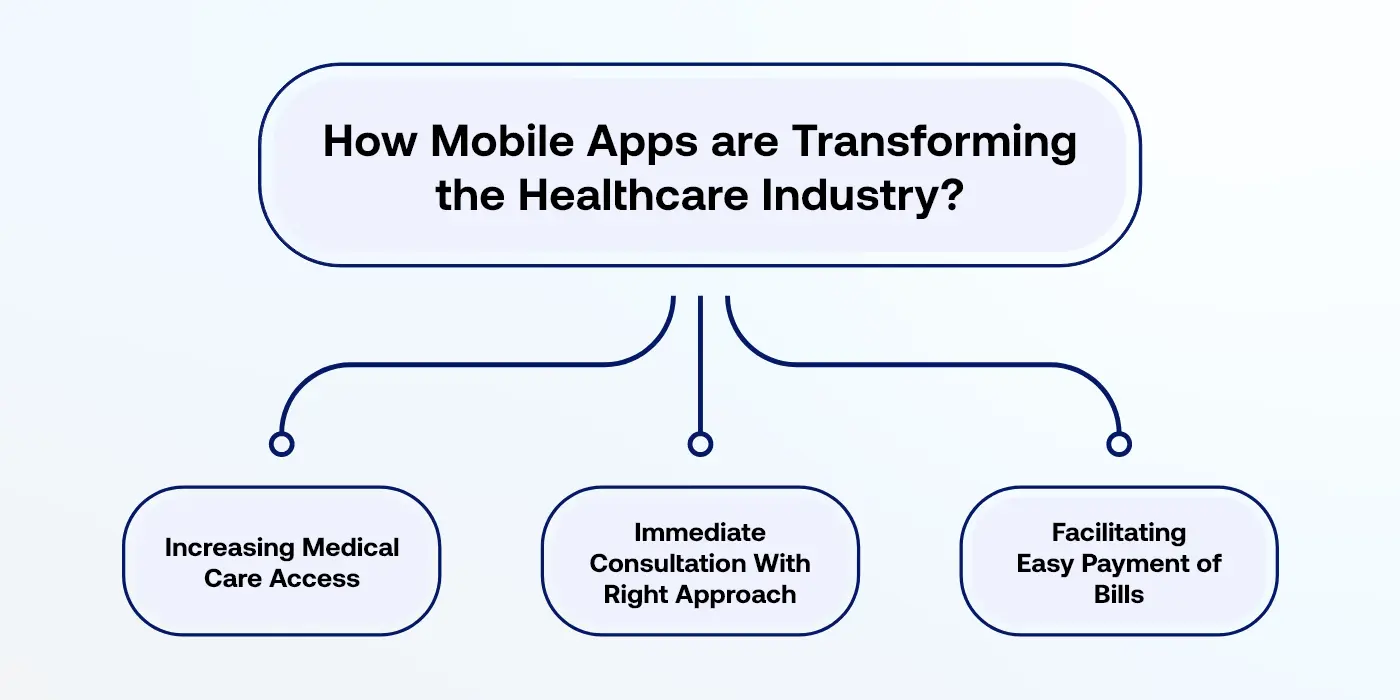
Top Reasons Why Mobile Apps Are Transforming Healthcare
The healthcare industry is going through one of its biggest makeovers ever-and it’s all thanks to mobile technology. From booking appointments to AI-assisted diagnosis, mobile apps for hospitals and clinics are making care faster, simpler, and more human.
What once took hours of paperwork and phone calls now happens in seconds, with just a few taps. Let’s explore the key reasons why apps for healthcare have become the new backbone of modern medicine.
-
Patient Engagement Is at an All-Time High
One of the biggest struggles in healthcare has always been keeping patients actively involved in their own care. Missed appointments, forgotten medications & unclear instructions often lead to poor outcomes.
But apps for healthcare are changing that completely. Through push notifications, appointment reminders, and personalized dashboards, patients stay informed and motivated. They can track their vitals, review doctor’s notes & even message nurses directly.
For example, apps like Mayo Clinic or Cleveland Clinic MyChart allow patients to see lab results instantly and message their care team securely. This transparency builds trust and accountability.
When patients feel more connected, they make better health choices-and that’s the foundation of preventive care.
-
Clinical Workflows Are Smoother Than Ever
Doctors and nurses used to spend hours each day managing paperwork and chasing test results. Apps for healthcare professionals are ending that frustration.
Now, everything from patient records to lab updates syncs automatically on one platform. A doctor can view a patient’s medical history, prescribe medication, and share notes with a specialist-all within the same mobile app.
This seamless coordination reduces delays and human errors. Nurses spend less time logging data and more time caring for patients. Administrators can monitor staff activity, bed occupancy & billing in real time.
In today’s fast-paced healthcare environment, technology plays a vital role in streamlining patient care and reducing administrative burdens. By integrating tools like an AI medical scribe, hospitals can transform complex workflows into a seamless, well-organized system—making care delivery faster, more accurate, and highly efficient.
-
Remote Monitoring Has Changed the Game
Imagine a diabetic patient who checks their blood sugar at home. The data automatically syncs to their doctor’s app & any sudden spike triggers an alert. That’s remote patient monitoring-and it’s saving lives every day.
Mobile apps for hospitals and clinics now connect with wearable devices, fitness trackers, and IoT sensors. This gives doctors a 24/7 view of their patients’ health, even when they’re miles away.
For patients with chronic conditions-like heart disease, asthma, or hypertension-this kind of monitoring helps prevent complications and hospital readmissions. For healthcare providers, it reduces emergency visits and improves overall care quality.
The pandemic proved just how valuable this model is. Today, remote monitoring has become a permanent part of the care ecosystem.
-
Telemedicine Brings Doctors to Every Home
When you combine mobile apps with video calling and secure chat, you get telemedicine-the modern way to consult a doctor without visiting the clinic.
During the COVID-19 outbreak, telehealth usage in the U.S. surged by over 3000%. Now, it’s a standard part of healthcare delivery. Apps for healthcare enable patients to connect with specialists, get prescriptions, and even access mental health counseling-all from their phones.
For rural patients or those with mobility challenges, this is life-changing. It eliminates travel time, reduces exposure risk and cuts healthcare costs dramatically.
On the provider side, telemedicine apps help manage workloads efficiently. Doctors can attend to more patients in less time, while hospitals expand their reach far beyond their physical walls.
-
Data Accuracy Has Reached New Heights
In traditional healthcare, errors in patient data-like wrong doses or outdated reports-could have serious consequences. But apps for healthcare professionals are making those issues rare.
When medical data is digitized and synchronized in real time, everyone in the care chain works with the same, up-to-date information. Electronic Health Records (EHRs) integrated into mobile apps ensure that a doctor in the ER and a specialist in another city both see identical data.
This consistency improves diagnosis accuracy and prevents mistakes. Moreover, with advanced AI tools, these apps can even flag inconsistencies or detect patterns that humans might miss.
In simple words- better data, better decisions, better care.
-
Security and Compliance Are Built-In
Patient trust depends on privacy. That’s why mobile apps for hospitals and clinics are now built to meet strict compliance standards like HIPAA and GDPR.
Modern apps use features like biometric logins, end-to-end encryption & secure cloud storage to ensure data safety. Access controls restrict who can view what, so patient details remain confidential.
For healthcare professionals, this means they can communicate and share data freely without risking breaches. For patients, it means peace of mind-knowing their most sensitive information is protected.
Security used to be a roadblock in digital healthcare adoption. Today, it’s one of the strongest reasons to trust mobile healthcare technology.
-
Cost Reduction Through Smart Automation
Healthcare costs are rising globally and providers are under pressure to do more with less. Mobile technology helps bridge that gap through automation.
Apps for healthcare automate repetitive tasks like appointment scheduling, billing, and prescription renewals. AI-driven analytics can even predict peak patient hours, helping hospitals optimize staff allocation.
For instance, a medium-sized hospital that implemented an internal operations app saw a 25% drop in administrative costs and a 15% improvement in patient throughput within six months.
Fewer errors, faster processes and better planning lead to direct savings-and that’s critical for both private clinics and large hospital networks.
-
Personalized Healthcare Is Finally Real
Every patient is unique, yet traditional healthcare often treats them the same. That’s changing fast. Apps for healthcare professionals now use artificial intelligence (AI) and machine learning to deliver personalized treatment recommendations based on a patient’s lifestyle, genetics & medical history.
For example, an app might suggest a specific meal plan for a diabetic patient or send stress-relief reminders to someone with heart disease. The app learns from the patient’s daily habits and adjusts recommendations over time.
This level of personalization improves adherence, accelerates recovery and keeps patients actively involved in their health journey.
Personalized healthcare isn’t just a buzzword-it’s the future, powered by data and mobile technology.
-
Collaboration Between Providers Has Never Been Easier
Healthcare is rarely a solo effort. It takes doctors, nurses, specialists, labs, and administrators working together. The challenge has always been communication across departments.
That’s where mobile apps for hospitals and clinics shine. They create unified channels for messaging, file sharing, and task management. For instance, if a radiologist uploads a scan, the physician gets an instant notification. If a lab updates a test result, the nursing team sees it immediately. This eliminates delays and miscommunication that used to slow care down.
Apps like TigerConnect or Vocera are already helping hospitals improve team coordination and reduce response times by up to 50%.
When the whole team is in sync, patient outcomes naturally improve.
-
Predictive Analytics Is Preventing Problems Before They Start
Mobile apps aren’t just reactive-they’re predictive. By analyzing patient data over time, they can spot patterns and alert doctors about potential health risks.
For example, if a patient’s oxygen levels drop suddenly or their heart rate spikes, the app can automatically notify the care team. Hospitals can act early, preventing emergencies or hospitalizations.
This shift from treating illness to predicting and preventing it is one of the biggest wins of modern healthcare apps. It’s not just about managing diseases-it’s about maintaining wellness.
-
A Better Experience for Everyone
At the heart of it all, apps for healthcare make life easier-for patients and professionals alike. Patients love the convenience- no waiting lines, no misplaced files, no confusion. Doctors love the clarity- instant updates, accurate data, and smooth communication.
Hospitals, meanwhile, benefit from efficiency, reputation & higher patient retention. A well-designed healthcare app doesn’t just improve care delivery-it enhances every touchpoint in the patient journey.
-
Real-World Proof
Let’s take a quick look at how major players are already using apps for healthcare professionals and patients alike –
- Mayo Clinic App – Offers 24/7 symptom tracking, virtual consultations & integrated lab data.
- Teladoc Health – Provides instant teleconsultations for millions worldwide, cutting wait times drastically.
- Cleveland Clinic MyChart – Gives patients real-time access to test results and appointment schedules.
- Practo (India) – Connects doctors and patients through online consultations and appointment management.
These success stories show one thing clearly- healthcare apps aren’t the future-they’re the present.
The Big Picture
From rural telehealth to smart wearables, from AI-driven diagnosis to patient engagement, mobile apps for hospitals and clinics are transforming healthcare at every level.
They empower patients, simplify life for doctors & make hospitals more efficient than ever before. Most importantly, they make healthcare personal again-something technology was once blamed for taking away.
The next time you book an appointment, track your vitals, or message your doctor, remember- you’re part of a new healthcare era. One where the phone in your pocket is as vital as the doctor’s stethoscope.
That’s the power of apps for healthcare-and it’s only getting stronger from here.
Use Cases- How Leading Healthcare Companies Use Mobile Apps
When it comes to digital transformation, some healthcare giants are already setting the gold standard. They’re proving that mobile apps for hospitals and clinics don’t just improve convenience-they completely reshape how healthcare works. From patient engagement to operational efficiency, these real-world examples show the power of technology done right.
-
Mayo Clinic App – Personalized Care in Every Pocket
The Mayo Clinic App is one of the most trusted examples of how apps for healthcare can strengthen the patient-doctor connection. Designed for both iOS and Android, it provides everything a patient needs-appointment booking, test results, symptom checkers, and even personalized health recommendations.
What makes it stand out is how seamlessly it connects with Mayo’s Electronic Health Records. Patients can access their medical summaries, doctor’s notes, and medication lists in real time. The app even suggests lifestyle tips and follow-ups based on the user’s conditions.
For doctors, this means fewer administrative calls and better-prepared patients. For users, it’s like carrying their entire health history in their pocket.
-
Teladoc Health – Virtual Consultations Without Borders
If there’s one company that made remote care mainstream, it’s Teladoc Health. Their mobile platform connects patients to licensed physicians through secure video and voice calls-anytime, anywhere.
During the pandemic, Teladoc’s usage exploded, with millions turning to virtual care for routine checkups, chronic disease management, and mental health support. Patients can upload medical reports, receive prescriptions & even integrate data from wearables.
For healthcare professionals, Teladoc’s platform offers built-in tools for note-taking, billing & follow-up scheduling-all in one dashboard.
-
Cleveland Clinic MyChart – Empowering Patients Through Data
The MyChart app by Cleveland Clinic focuses on transparency and patient empowerment. Users can view lab results, schedule appointments, request refills & message their care teams securely.
Its biggest advantage is real-time synchronization with hospital systems, ensuring every update-test, medication, or visit-is reflected instantly. Doctors benefit from better-prepared patients, while patients feel more control over their health journeys.
MyChart also supports telehealth visits, allowing patients to connect with doctors without leaving their homes.
-
Apollo 24/7 – India’s All-in-One Healthcare Ecosystem
In India, Apollo Hospitals revolutionized healthcare access with the Apollo 24/7 app. It combines teleconsultations, pharmacy orders, diagnostic bookings, and health tracking under one roof.
This all-in-one approach bridges urban and rural care gaps, making Apollo’s services available across the country. It’s not just a telehealth tool-it’s a digital ecosystem for holistic care.
For doctors, the app integrates with Apollo’s internal systems, enabling faster consultations and follow-ups. For patients, it means convenience, trust & instant access to world-class care.
The ROI of Mobile Health Apps for Providers
The healthcare industry isn’t just healing people-it’s also managing enormous systems, resources, and costs. Between rising patient expectations, administrative overload & staff shortages, efficiency matters more than ever. That’s why the ROI of mobile apps for hospitals and clinics isn’t just about money-it’s about time, accuracy & better outcomes.
When healthcare providers invest in apps for healthcare, the payoff comes in multiple ways- reduced operational costs, higher patient satisfaction, smoother workflows, and stronger trust. Let’s break down how these apps are proving their value every day.
-
Streamlined Operations and Fewer Manual Tasks
Healthcare professionals spend a huge portion of their day on administrative work-updating charts, calling patients, managing billing, and recording vitals. Apps for healthcare professionals automate much of this, turning hours of paperwork into minutes of simple clicks.
For example, appointment scheduling and reminders can be fully automated, reducing missed visits. Digital forms replace manual entries, cutting errors in patient data. Nurses can log vital signs directly into mobile systems without re-entering them later.
This isn’t just a time-saver-it’s a morale booster. When clinicians spend less time on repetitive tasks, they spend more time doing what they’re trained for- caring for patients. Efficiency translates directly into cost savings, without compromising quality.
-
Improved Patient Retention and Satisfaction
The importance of healthcare apps for patients is easy to see when you look at their daily routines. Patients today want simple, instant access-whether it’s booking a test, viewing lab results, or chatting with their doctor.
A well-designed mobile app for hospitals and clinics gives patients control over their health journey. They can see upcoming appointments, get reminders, manage prescriptions, and view doctor’s advice anytime. This level of convenience increases engagement and reduces no-shows or last-minute cancellations.
For providers, that means steadier appointment flow and stronger patient relationships. Retaining an existing patient is far more cost-effective than acquiring a new one-and healthcare apps make retention natural by building loyalty through ease of use and trust.
-
Reduced Communication Gaps Across Departments
In traditional hospital setups, communication delays are a major source of inefficiency. A lab result might take hours to reach the physician. A specialist’s note might get lost in the system. Apps for healthcare eliminate these friction points by connecting teams in real time.
Doctors, nurses, lab technicians & administrators can access shared dashboards that update instantly. Push notifications alert doctors when test results are ready. Patients can be informed of discharge plans without waiting for physical paperwork.
When everyone is connected through the same mobile platform, care coordination improves-and so does overall hospital performance. Faster communication reduces duplicate work, shortens waiting times & helps providers treat more patients effectively each day.
-
Better Decision-Making Through Data Access
One of the most underrated advantages of apps for healthcare professionals is the immediate access to accurate data. Instead of sifting through physical files, doctors can review patient histories, medications, allergies & recent test results directly from their mobile devices.
This access reduces diagnostic delays and ensures that every decision is informed. For administrators, data insights from these apps help identify patterns-like high readmission rates or bottlenecks in service delivery. They can then take timely action to fix issues and improve outcomes.
The result? Better efficiency, lower risk, and more informed strategic planning-all of which contribute to a measurable return on investment.
-
Lower Readmission and Follow-Up Costs
Another clear area where mobile apps for hospitals and clinics deliver value is post-care management. Hospitals often face unnecessary readmissions due to missed follow-ups or unmonitored recovery.
Through mobile apps, patients receive medication reminders, recovery tips, and follow-up notifications. They can even upload health updates or chat with nurses remotely if symptoms arise. This proactive communication helps prevent minor issues from turning into hospital visits.
For hospitals, fewer readmissions mean fewer costs and better use of resources. For patients, it means smoother recovery and peace of mind. This balance benefits both sides-clinically and financially.
-
Enhanced Transparency and Trust
Healthcare runs on trust & digital platforms can strengthen it when used correctly. Apps for healthcare bring transparency into every interaction-whether it’s showing test results on time, clarifying billing details, or providing aftercare instructions.
Patients appreciate knowing exactly what’s happening with their treatment. They can track progress, review notes, and communicate directly with care providers. This transparency improves satisfaction and reduces misunderstandings or disputes.
Hospitals benefit too- fewer patient complaints, higher satisfaction scores, and improved reputation-all critical factors that influence growth and profitability in the long run.
-
Scalability Without Expanding Infrastructure
Expanding a hospital’s reach traditionally meant adding more facilities, staff, or physical resources. With apps for healthcare professionals, scalability becomes digital.
A single mobile platform can serve hundreds of additional patients without expanding floor space. Teleconsultations, automated triage systems & patient self-service features help hospitals reach more people at lower costs.
This is especially important for regional or multi-branch healthcare systems, where a single mobile ecosystem can connect multiple clinics and share data seamlessly.
Related reading: Healthcare Chatbots Development – AI Features, Use Cases & Benefits
Here’s how mobile apps for hospitals and clinics are reshaping the entire healthcare experience for both patients and providers –
- 24/7 Patient Access to Care: Patients can schedule appointments, view reports, and message doctors anytime-boosting engagement and convenience.
- Streamlined Workflows for Professionals: Apps for healthcare professionals automate charting, prescription updates & patient tracking, saving time and reducing paperwork.
- Improved Doctor–Patient Communication: Real-time chat, video calls, and alerts keep care continuous and personal, eliminating long waiting cycles.
- Accurate and Centralized Health Records: Integrated EHR access ensures every provider sees the same up-to-date data, improving diagnosis and coordination.
- Lower Operational Costs: Automated scheduling, billing, and reporting reduce manual workload and administrative expenses.
- Remote Patient Monitoring: Apps linked to wearables let doctors track vital signs, detect anomalies early & manage chronic conditions effectively.
- Enhanced Data Security and Privacy: Encrypted communication and secure login systems protect sensitive medical data and maintain regulatory compliance.
- Personalized Health Insights: AI-driven analytics recommend tailored treatment plans, diets, and medication reminders for each patient.
- Reduced Readmission Rates: Regular reminders, virtual follow-ups & digital aftercare help patients recover faster and prevent unnecessary hospital visits.
- Better Collaboration Between Departments: Real-time data sharing connects doctors, nurses, labs, and pharmacies-improving coordination and speed of care delivery.
- Increased Patient Loyalty and Satisfaction: The importance of healthcare apps for patients lies in their ease of use, transparency & empowerment throughout the care journey.
- Paperless Administration: Digital documentation minimizes errors, improves compliance & saves storage space for hospitals.
- Scalable and Future-Ready Systems: Apps for healthcare allow hospitals to expand services digitally without increasing physical infrastructure.
- Quick Access to Critical Information: During emergencies, mobile access to health history and allergies helps doctors make faster, safer decisions.
- Continuous Professional Development: Medical professionals can access learning modules, guidelines & case discussions within the same platform.
How to Build a Successful Healthcare Mobile App (Step-by-Step Guide for 2025)
Building mobile apps for hospitals and clinics isn’t just about coding and design-it’s about creating trust, safety, and simplicity for people dealing with their most personal information- their health. A great app must balance technology with empathy. It should make healthcare smoother, faster & more transparent without overwhelming users or professionals.
Let’s break down how healthcare providers and developers can build a successful, secure & patient-centered mobile app from the ground up.
-
Start with the Right Purpose
Every successful app starts with a clear goal. For healthcare providers, that goal might be-
- Improving patient engagement,
- Streamlining hospital workflows, or
- Extending care beyond physical visits through telemedicine.
Before development begins, identify who the app will serve-patients, doctors, or both. The importance of healthcare apps for patients is rooted in accessibility, while for professionals, it’s about efficiency and informed decision-making. A clear purpose ensures that the design, features & tech stack align with the end users’ needs.
-
Identify the Core Features
Once you know your audience, define your core features. Here are the essentials most apps for healthcare should include-
- User Profiles- Secure login with personalized dashboards for patients and doctors.
- Appointment Scheduling- Easy booking, rescheduling, and cancellation tools with reminders.
- EHR Integration- Real-time access to medical records for providers and patients.
- Teleconsultation- Video calls, chat, or voice-based consultations for remote care.
- Prescription Management- Digital prescriptions and pharmacy integration for seamless medicine delivery.
- Notifications & Reminders- Alerts for appointments, medication, and test results.
- Billing & Payments- Secure, transparent billing options with receipts and transaction tracking.
- Analytics Dashboard- For hospitals to monitor performance, trends & patient satisfaction.
Depending on your audience, apps for healthcare professionals may also include-
- Shift management, patient queue updates, or voice-based note dictation tools.
- AI-assisted diagnosis support or data visualization dashboards.
-
Design for Humans, Not Just Systems
Healthcare can be stressful, so the user experience must feel calm and intuitive. The best mobile apps for hospitals and clinics use simple navigation, minimal screens, and friendly tones.
- For Patients- Keep forms short, text readable & buttons clear. Use icons and plain language instead of medical jargon.
- For Professionals- Provide quick access to critical data. For example, allow doctors to view a patient’s summary on one screen instead of toggling between multiple tabs.
Good UI/UX design improves adoption rates-especially among elderly users and busy clinicians.
-
Prioritize Data Security and Compliance
No matter how sleek your app looks, it must meet global privacy standards. The healthcare sector handles sensitive data that demands top-tier protection.
For developers, this means-
- Encrypting all patient communications and files.
- Using secure authentication (fingerprint, OTP, or face ID).
- Storing data in compliance with HIPAA (U.S.), GDPR (Europe), or NABH (India) standards.
- Restricting data access through role-based permissions.
Security isn’t just a legal checkbox-it’s a trust factor. The more users believe their data is safe, the more they’ll engage with your app.
-
Integrate Seamlessly with Existing Systems
Hospitals already use multiple systems-EHRs, billing software, lab management tools, and appointment portals. A strong healthcare app should integrate with these, not replace them.
APIs (Application Programming Interfaces) make this possible by linking external systems securely. This way, patient data, prescriptions & lab results flow automatically across platforms.
For apps for healthcare professionals, smooth integration means fewer login screens, fewer errors, and faster updates-creating a truly unified workflow.
-
Add Smart Technology for Real-Time Insights
The best apps for healthcare don’t just display data-they interpret it. Artificial Intelligence (AI), Machine Learning (ML), and the Internet of Things (IoT) are revolutionizing care delivery.
Some real-world examples of smart features include-
- AI-driven symptom checkers that offer early diagnostic suggestions.
- IoT device syncing for real-time vitals tracking (e.g., heart rate, glucose, sleep).
- Predictive analytics that warn doctors of potential complications.
These technologies don’t replace medical judgment-they enhance it by turning raw data into actionable insights.
-
Focus on Accessibility and Inclusivity
Healthcare should be for everyone, not just the tech-savvy. That means your app must be easy to use for patients of all ages, languages & abilities.
Consider these best practices-
- Add voice navigation for visually impaired users.
- Support multiple languages for diverse populations.
- Use high-contrast designs for better visibility.
- Ensure accessibility compliance (WCAG 2.1 standards).
The importance of healthcare apps for patients lies in their inclusivity-ensuring that digital care doesn’t leave anyone behind.
-
Test, Iterate, and Validate with Real Users
Before launch, your app must go through rigorous testing. That means not only technical QA (for bugs or crashes) but also usability testing with real healthcare professionals and patients.
- Test performance on both iOS and Android.
- Simulate real hospital scenarios (like high-traffic load or poor internet).
- Get user feedback from doctors, nurses & patients to refine workflows.
Continuous feedback after launch is equally important. The best mobile apps for hospitals and clinics evolve over time-adding new features and improving user experience based on real-world behavior.
-
Plan for Scalability from Day One
Healthcare needs grow fast-new services, more users, and constant updates. Your app architecture should be cloud-based, flexible, and scalable.
Cloud hosting ensures reliable uptime, data backup & faster global access. It also supports expansion-so you can easily roll out new features like AI chatbots, teletherapy, or pharmacy integrations in the future.
A scalable app means you’re not rebuilding every year; you’re upgrading seamlessly as your hospital or clinic grows.
-
Measure Success Beyond Downloads
Success in healthcare isn’t measured by app installs alone. It’s measured by outcomes.
Here’s what hospitals and clinics should track post-launch-
- Appointment completion rates.
- Reduction in admin time for staff.
- Patient engagement levels (login frequency, feedback).
- Response time for queries or emergencies.
- Average follow-up completion rates.
These metrics help validate your ROI and guide continuous improvement. The goal is to build an app that adds measurable value-to patients, doctors & the system as a whole.
-
Choose the Right Development Partner
Finally, building apps for healthcare professionals and patients demands a development team that understands both technology and compliance. Look for partners experienced in medical data standards, security protocols, and hospital integrations.
They should be able to translate your business goals into functional designs and ensure the final product meets all quality and regulatory benchmarks.
Remember, healthcare apps aren’t ordinary apps-they’re digital lifelines. Choose partners who treat them with the seriousness they deserve.
Conclusion – The Future of Healthcare Is Mobile
The healthcare industry is no longer confined to clinics and waiting rooms-it’s in everyone’s hands. Mobile apps for hospitals and clinics have transformed how patients access care and how providers deliver it. From digital consultations to real-time monitoring, these apps for healthcare make treatment faster, safer, and more personalized.
The importance of healthcare apps for patients goes beyond convenience-it’s about empowerment and prevention. For apps for healthcare professionals, it’s about smarter workflows and better outcomes. As technology evolves, healthcare will continue moving toward accessibility, precision & connection-all powered by mobile innovation.
Transform Care with Smart Healthcare Apps
Bring your hospital or clinic closer to patients through intelligent, secure, and scalable mobile solutions.
Frequently Asked Questions
They make healthcare accessible, quick, and transparent–allowing patients to book visits, access data, and communicate with doctors anytime.
They automate documentation, streamline communication and provide instant access to patient data, saving hours each day.
Yes. Most apps follow HIPAA or GDPR standards, using encryption and secure authentication to protect sensitive data.
They help patients track their health, get reminders, and stay connected to their care teams–improving outcomes and engagement.
Absolutely. Even small practices can use custom apps to reduce no-shows, simplify billing, and enhance patient communication.
Featured Blogs
Read our thoughts and insights on the latest tech and business trends
How to Enable AI for Smart Diet Planning and Client Progress Tracking
- November 26, 2025
- Artificial Intelligence
Smart diet planning and consistent progress tracking have become essential in a world where people want faster, more accurate ways to manage their health. Traditional methods like manual calorie counting or generic meal charts often... Read more
How to Digitize Your Home-Service Business with an AI-Powered Platform
- November 21, 2025
- Home Services
The home-service industry - covering HVAC, plumbing, electrical, and cleaning—has long relied on manual scheduling, phone-based bookings, and paper invoices. But as customer expectations shift toward instant communication and transparency, these traditional processes are no... Read more
How a Voice AI Agent Can Help You Get More Appointments and Leads
- November 17, 2025
- Artificial Intelligence
Missed calls, delayed responses, and lost leads are silent revenue killers for many businesses. In today’s fast-moving market, customers expect instant engagement - and that’s exactly where a voice AI agent for appointment booking steps... Read more
